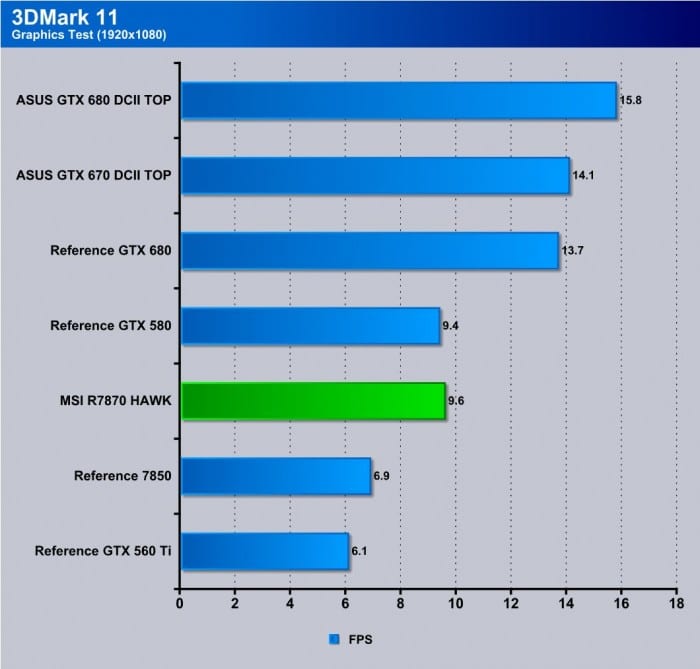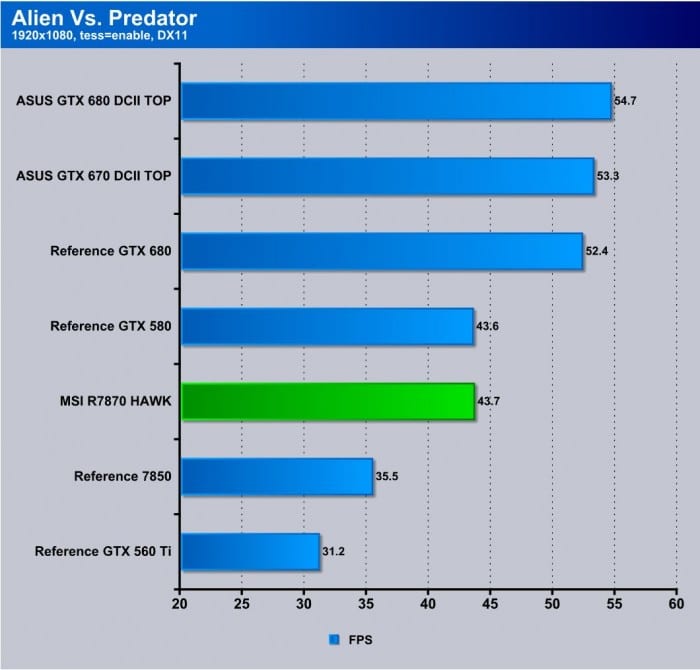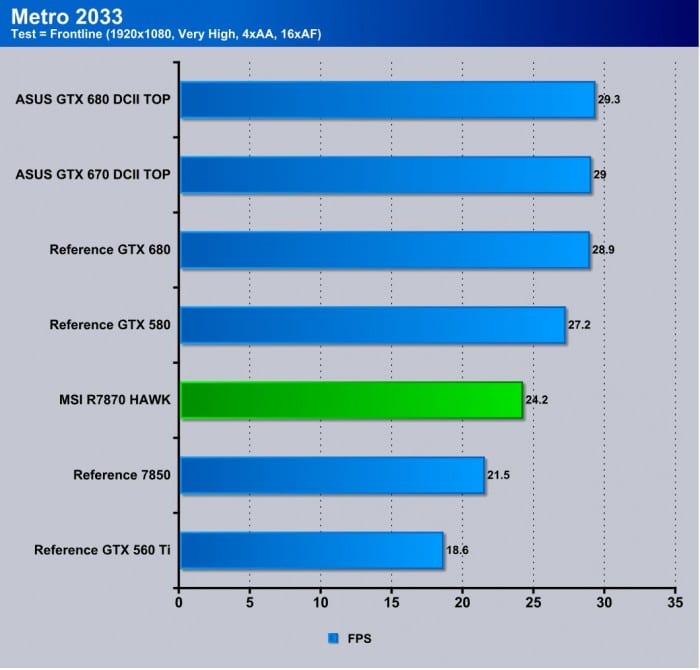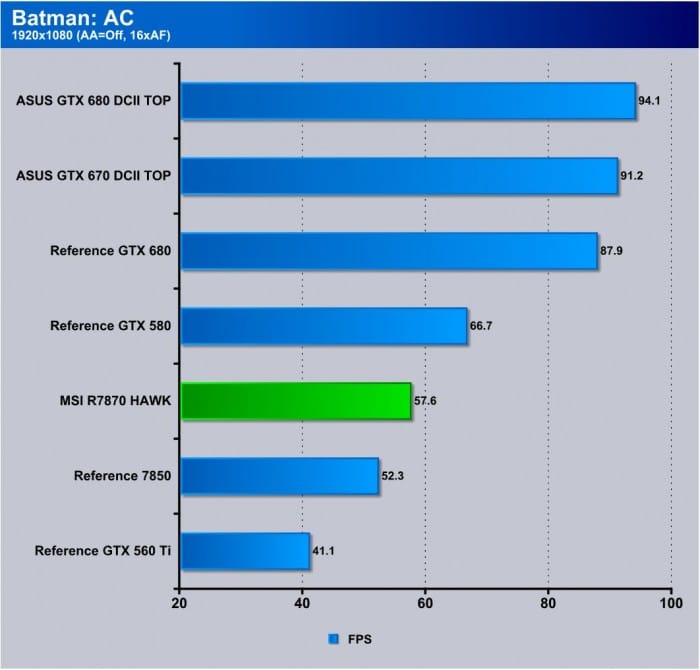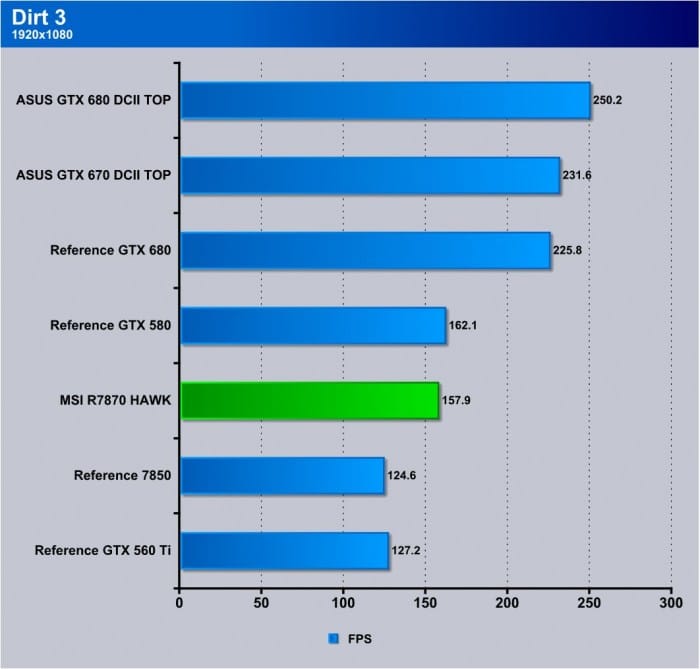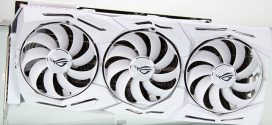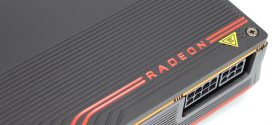MSI R7870 HAWK Edition
Testing & Methodology

We’ve expanded our testing suite considerably since the X79 chipset release, and will continue to use the same methods for most of the motherboards and CPU’s we test. In the interests of thoroughness and accurate results, we run each test at least three times, and some tests more than that. We average the total of all the tests from each benchmark then report the average here.
The OS we use is Windows 7 Pro 64bit with all patches and updates applied. We also use the latest drivers available for the motherboard and any devices attached to the computer. We do not disable background tasks or tweak the OS or system in any way. We turn off drive indexing and daily defragging. We also turn off Prefetch and Superfetch. This is not an attempt to produce bigger benchmark numbers. Drive indexing and defragging can interfere with testing and produce confusing numbers. If a test were to be run while a drive was being indexed or defragged, and then the same test was later run when these processes were off, the two results would be contradictory and erroneous. As we cannot control when defragging and indexing occur precisely enough to guarantee that they won’t interfere with testing, we opt to disable the features entirely.
Prefetch tries to predict what users will load the next time they boot the machine by caching the relevant files and storing them for later use. We want to learn how the program runs without any of the files being cached, and we disable it so that each test run we do not have to clear Prefetch to get accurate numbers. Lastly we disable Superfetch. Superfetch loads often-used programs into the memory. It is one of the reasons that Windows occupies so much memory. Vista fills the memory in an attempt to predict what users will load. Having one test run with files cached, and another test run with the files un-cached would result in inaccurate numbers. Again, since we can’t control its timings so precisely, it we turn it off. Because these four features can potentially interfere with benchmarking, and and are out of our control, we disable them. We do not disable anything else.
We are revamping our testing method in order to better represent motherboard performance and offering to the consumer. Also we want to make it an easier read for you without miles of endless charts. We ask that you provide feedback in an effort to help us deliver better reviews for you.
Test Rig
| Test Rig | |
| Case | Open Air Test Bench |
| CPU | Intel Core i7-3770K |
| Motherboard | Gigabyte Z77X-UP5 TH |
| Ram | 16GB Patriot Viper Xtreme 2400MHz + |
| CPU Cooler | Swiftech H20-320 Edge |
| Hard Drive | Western Digital Velociraptor 300GB |
| SSD | Intel 510 series SATA III 120GB |
| Optical | ASUS BD-ROM |
| GPU | MSI R7870 HAWK 2GB |
| Additional Cards |
N/A |
| PSU | Thermaltake Toughpower Grand 1200W |
| Mouse | Tt eSPORTS Black gaming mouse |
| Keyboard | Tt eSPORTS Meka G1 mechanical gaming keyboard |
Test Suite
We will use the following applications to test the performance of the graphics card.
Synthetic Benchmarks & Games
| Benchmarks |
|---|
| 3DMark11 |
| Aliens vs. Predator |
| Batman: Arkham City |
| Dirt 3 |
| Metro 2033 |
Overclocking

The MSI R7870 HAWK edition combined with the advanced controls offered from the MSI Afterburner software allowed us to easily get the card clocked to around 1290MHz for the core, with the fan at full tilt. However, most gamers will not want the fan at full speed 24/7, so we would recommend a milder overclock of around 1250MHz. We were able to accomplish this without pushing the card too hard and the fan was left on auto with full stability. All this is with standard cooling, and we haven’t even touched on the possibilities granted by the GPU Reactor module.
Memory clocking was quite good as we saw much headroom in this card as it easily pushed past the stock 1200 clock and fell right in line at 1580 MHz with full stability from our testing. Your card may not necessarily be happy here for 24/7 use, but it is a reachable goal.
In order to ensure no system bottleneck we clocked the CPU to 4.6GHz to ensure there is no reason the system will slow down the card’s performance at all.
Some may ask why we chose the mainstream Z77 system, and we can explain. Up until recent the X79 enthusiasts platform did not really support PCI-E Gen 3 on the Nvidia 600 series GPU’s. Because of the inherent instability many have seen with the X79 platform with Gen 3 products, Nvidia has been hesitant to enable it, and now there is a workaround via registry to get it working. However, in order to ensure the most consistent testing possible, we have stuck to the natively supported Z77 platform.
Important note: Overclocking can cause component failure. Please exercise caution when attempting any level of overclock on system components.
Temperatures

The temperatures were recorded with full loaded Heaven benchmark looping for over 30 minutes or longer depending how long it took for the card to level out in temps and sat at a plateau for more than 10 minutes.
| GPU Temperatures | Temperature (Idle/Load) |
| MSI R7870 HAWK OC | 33C/78C |
| MSI R7870 HAWK | 31C/74C |
The Twin Frozr cooler easily kept the card in check even pushing the limit on overclocking but as temps neared 80 C during overclocking, we decided it was time to call our max, as we would rather have a slightly lower clockspeed than damage components in the pursuit of more MHz.
Real world/Gaming Benchmarks
3DMARK 11

3DMark 11 is the newest in Futuremark’s suite of benchmarking utilities. Its a fully capable DirectX11 benchmark which also stresses and analyzes the system performance as a whole to simulate a heavy rendering environment such as a high end game or other app the end user may run. This benchmark was run with Performance settings 5 times and all runs were averaged for the result below.
Here we can see where the R7870 starts off and finds itself amongst a pack of big brothers, and even some underlings. The R7870 HAWK takes on Nvidia’s GTX580 and bests it ever so slightly, so this card is looking pretty good so far.
Aliens Vs Predator
Aliens Vs Predator is a quite demanding game and overall just a cool title so we had some fun running this one through its paces.
In Alien vs Predator we see the 7870 once again a step ahead of the GTX 580; most likely, the out of the box overclock helped with this capability.
Metro 2033

Metro 2033 likely one of the most demanding games that we have tested with, as it brings virtually every GPU to its knees. The 7870 is no exception, but in this bout the raw power of the GTX 580 GPU shines through as it takes a commanding 3 FPS lead over the 7870. Keep in mind, however, that the 7870 is a midrange performance model, whereas the GTX 580 is top of the line.
Batman: Arkham City
Batman is a popular game, which is why we include it. Here once again the GTX 580 shines ahead quite a bit and puts the 7870 in its place.
Dirt 3
Dirt 3 was highly marketed by AMD, so we are not surprised to see the 7870 shine here. It just barely trails the GTX 580, which shows that gaming performance can vary greatly depending on the game and how it is made.
 Bjorn3D.com Bjorn3d.com – Satisfying Your Daily Tech Cravings Since 1996
Bjorn3D.com Bjorn3d.com – Satisfying Your Daily Tech Cravings Since 1996
